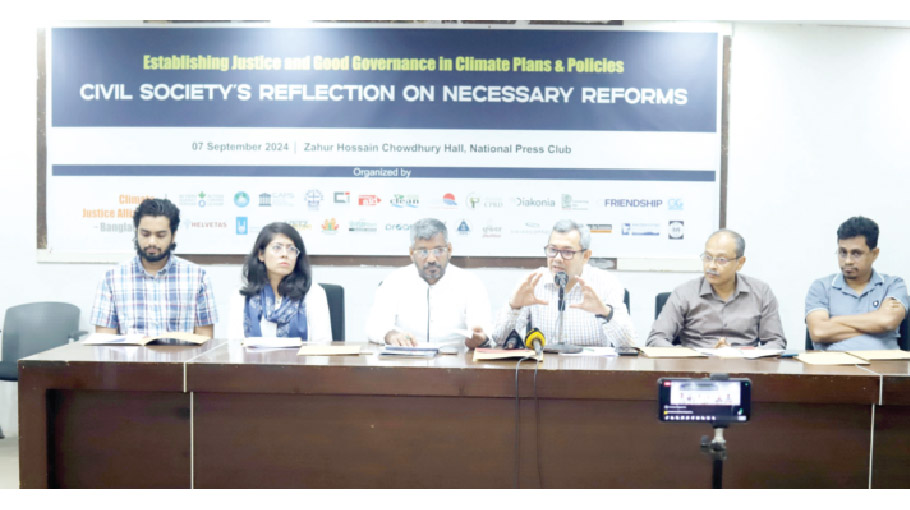Cancellation of Mujib Climate Prosperity Plan demanded

Some civil society organisations have demanded cancellation of the Mujib Climate Prosperity Plan (MCPP) 2022-2041, saying that it was formulated in an undemocratic process and designed to implement the political ambitions of the-then Awami League government.
The civil society organisations also demanded reform to the Bangladesh Climate Change Trust Fund (BCCTF) and the Climate Change Trust Fund Act to prevent syndicated corruption in funding decisions and implementation.
A total 39 civil society organisations under the banner ‘Climate Justice Alliance-Bangladesh’ made the demand at a press conference at the National Press Club in the capital on Saturday.
Md Shamsudohha, coordinator of the coalition, read written statement at the press conference. He provided a brief overview of the political economy context of the developing country’s key climate plans, which include Mujib Climate Prosperity Plan (MCPP) 2022-2041, National Adaptation Plan (NAP) 2023-2050, and Nationally Determined Contribution (NDC), up to 2030.
He also provided an explanation how Bangladesh’s Climate Change Trust Fund, resourced from country’s revenue income, tuned to a worst example of political domination and syndicated corruption supported by the immunity of the Trust Fund Act.
The Alliance at the press conference appreciates the notion of the current interim government on the structural reform that would ensure justice and equitable development across the societies. Aligning with the border reform agendas, the Alliance emphasizes an urgent need to revise, extend, and reform the existing climate plans and policies to ensure that they are just and equitable. They questioned the undemocratic practices of the planning process dominated by the ‘syndicated interest’ of the political government, its allied bureaucrats, and elite consultants. The Alliance termed the existing plans and policies undemocratically developed and prone to corruption in their implementation.
The MCPP was developed exclusively by foreign consultants under the supervision of the previous government's Chief Coordinator of SDG affairs and without any broader consultation with relevant stakeholders. Given that the plan carried the name of Bangabandhu Sheikh Mujibur Rahman, offering critical feedback was a highly sensitive matter. MCPP estimated US$170.95 billion for implementing cost, of which US$140.2 billion is for infrastructure development and loan-based. Without any feasibility assessment, the plan estimated US$27.1 billion for a 4-gigawatt wind power generation project in the Bay of Bengal.
Md Shamsuddoha referred to the unjustified composition of the Climate Change Trust Fund Board. Among the 17 Trustee Board members, a total of 14 are ministers who usually consider political interest while compromising the critical adaptation needs of the climate-vulnerable people. In practice, the legal document of the fund’s operation and implementation – the Trust Fund Act— has ensured the all-out dominance of the politically biased bureaucrats and the ruling party, creating a favorable environment for unabated corruption.
Referring to the massive devastation of the recent flash flood, Professor Dr Ahmad Kamruzzaman Mazumder of Stamford University criticizes the loopholes in Bangladesh’s National Adaptation Plan that the plan has not been developed in the context of vulnerability arising from the country’s geographical diversity. He called for the localization of the National Adaptation Plan and the formulation of a Local Adaptation Plan by assessing location-specific climate vulnerabilities.
Md. Nashir Uddin Faruk, deputy executive director of Shushilan; pointed out that there has been a lack of coordination among government agencies and non-government entities. He urged for the revision, extension, and reformation of the climate plans and policies formulated so far, as a part of the reform campaign for the forward march towards democratization.
Tamanna Rahman, Thematic Lead- Climate and Resilience at Practical Action’ called for developing the NDC-3 through a participatory and transparent process and demanded a reasonable timeline for achieving the long-term goal of a Net-Zero Economy.
Md. Ahsanul Wahed, DM of MJF; and Farhan Hossin Joy, Research Consultant at Nagorik Uddyog; also spoke at the press conference.




